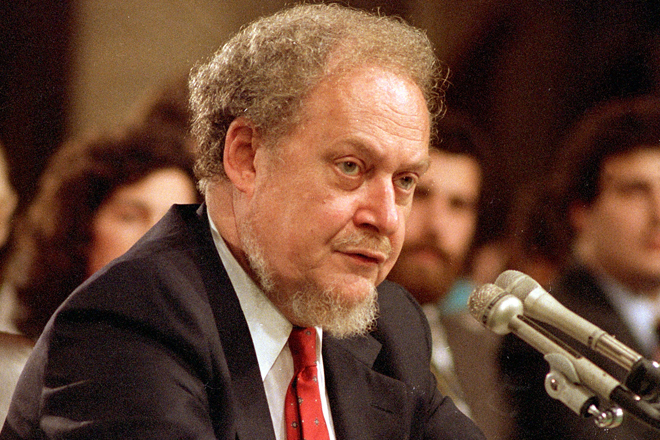Bork Was a Great Scholar, But Poor Guide to Modern Originalism
Like Mark Pulliam, I think a lot about Robert Bork: anyone who teaches either antitrust law or constitutional law should, and I teach both. He was great scholar. In particular, he powerfully challenged the conventional views of living constitutionalism that dominated his time and begin to make the intellectual case for originalism. But it was only the beginning of the case and does not mark the best understanding of originalism today. That is not a criticism of Bork, but reflects that he was one of the first to revive originalism. Almost all theories of law are refined and improved after the sifting of many minds.
The problem is that Bork’s theory combined judicial restraint—something he derived from his view of democracy—and original meaning. These are simply incompatible as first principles. If one begins, as I do, with the first principle of originalism, the question of the appropriate degree of judicial deference, if any, to legislation is itself a question of constitutional meaning. I have offered reasons rooted in original meaning that the Constitution imposes on judges a modest duty of deference in that the meaning of the Constitution must be relatively clear, after using traditional judicial methods of clarification, before invalidating legislation. This judicial duty is simply a product of original meaning, not some atextual policy of judicial restraint.
Nor does originalism rule out unenumerated rights, as Bork sometimes implied, if that is indeed the best reading of the Constitution’s text. In my view, the Ninth Amendment is not a fount of rights against the states, but that view does not derive from judicial restraint but from my reading of the Ninth Amendment. On the other hand, I believe that Privileges or Immunities Clause offers a modest shield against protectionist state legislation, but that view again is based on my reading of the original meaning of the term.
Some of the difficulty of combining a theory of judicial restraint with original meaning is reflected in Bork’s justly famous 1971 article, which was published in the Indiana Law Journal, “Neutral Principles and Some First Amendment Problems.” A careful reading of the article shows that it was largely rooted in the majoritarian tradition of political theory rather than in a theory of interpretation, as would be understood today. Bork’s concern here was how to give legitimacy to the Court in order to invalidate the results of legislative action, thus solving the countermajoritarian difficulty. While Bork acknowledged the rights of the minority, majority rule is treated as the more powerful norm.
Two elements of the article underscore this premise. First, while Bork criticizes many cases as wrongly decided, all are cases where the Court invalidates constitutional legislation and none where the Court fails to invalidate unconstitutional legislation. Second, Bork’s interpretation of the First Amendment—the payoff of the interpretive theory he proposes—owes much to making rights an instrument of the democratic process, confirming their essential primacy.
Indeed, his analysis of the First Amendment is not originalist by modern standards. He does no historical analysis himself. He cites Leonard Levy on a restrictive understanding of the First Amendment, but Levy’s work does not become the basis of his analysis,either. Instead he argues that the way to derive First Amendment law from neutral principles is to invoke the overarching principle of democracy embedded in the Constitution. The concern of the Constitution for democratic self-government is what provides the neutral principle to decide what speech should be protected—political speech that facilitates that democratic exercise and not, for instance, artistic speech or speech by those dedicated to overthrowing the ordinary democratic order.
It is interesting to note that Bork’s interpretive approach in this article has some substantial kinship with John Hart Ely’s Democracy and Distrust (1980). Both focus not so much on the historical meaning of the particular textual provision of the Constitution but on how the text is best interpreted in light of their view of the primacy of the democratic process.

